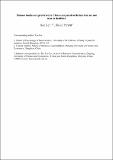Files in this item
Thinner bodies are preferred in China compared to Britain but are not seen as healthier
Item metadata
| dc.contributor.author | Lei, Xue | |
| dc.contributor.author | Perrett, David Ian | |
| dc.date.accessioned | 2023-09-30T23:36:43Z | |
| dc.date.available | 2023-09-30T23:36:43Z | |
| dc.date.issued | 2022-10-01 | |
| dc.identifier | 281421181 | |
| dc.identifier | 224a0537-d402-451d-8cc1-7b7a5b10abc4 | |
| dc.identifier | 000862523100002 | |
| dc.identifier | 85139196647 | |
| dc.identifier.citation | Lei , X & Perrett , D I 2022 , ' Thinner bodies are preferred in China compared to Britain but are not seen as healthier ' , Current Psychology , vol. First Online . https://doi.org/10.1007/s12144-022-03803-7 | en |
| dc.identifier.issn | 1046-1310 | |
| dc.identifier.other | ORCID: /0000-0002-6025-0939/work/120434369 | |
| dc.identifier.uri | https://hdl.handle.net/10023/28481 | |
| dc.description.abstract | Differences in preferences for body size between cultures are well documented. A well known explanation is that differences are a result of psychological adaptation to local environments. Since the optimal body size (often measured as Body Mass Index/BMI, weight divided by squared height kg/m2) for health differs between areas, the attractiveness and health judgements should also be different. Until now, no study has directly tested whether the difference in attractiveness perception is accompanied by a difference in health perception. In the current study, we compared the attractiveness and health judgements of male and female bodies varying in BMI and muscularity between British and Chinese participants. Since the health risks are greater for Chinese than British individuals with increasing BMI, one may expect Chinese participants to perceive a lower BMI as more attractive and healthier than British participants. Analyses showed that, although the Chinese participants preferred thinner partners compared to their British counterparts, there was no difference in the health judgements made by Chinese and British participants. Moreover, the male and female bodies that were seen as most attractive were thinner than those perceived as most healthy by Chinese participants. These findings challenge the adaptation account that people adjust their mate preferences to match what is most healthy in local environments. | |
| dc.format.extent | 572157 | |
| dc.language.iso | eng | |
| dc.relation.ispartof | Current Psychology | en |
| dc.subject | Attractiveness | en |
| dc.subject | Health | en |
| dc.subject | Adaptation | en |
| dc.subject | China | en |
| dc.subject | Britain | en |
| dc.subject | BMI | en |
| dc.subject | BF Psychology | en |
| dc.subject | DAS | en |
| dc.subject | SDG 3 - Good Health and Well-being | en |
| dc.subject.lcc | BF | en |
| dc.title | Thinner bodies are preferred in China compared to Britain but are not seen as healthier | en |
| dc.type | Journal article | en |
| dc.contributor.institution | University of St Andrews. School of Psychology and Neuroscience | en |
| dc.contributor.institution | University of St Andrews. Institute of Behavioural and Neural Sciences | en |
| dc.contributor.institution | University of St Andrews. Centre for Social Learning & Cognitive Evolution | en |
| dc.identifier.doi | 10.1007/s12144-022-03803-7 | |
| dc.description.status | Peer reviewed | en |
| dc.date.embargoedUntil | 2023-10-01 |
This item appears in the following Collection(s)
Items in the St Andrews Research Repository are protected by copyright, with all rights reserved, unless otherwise indicated.

